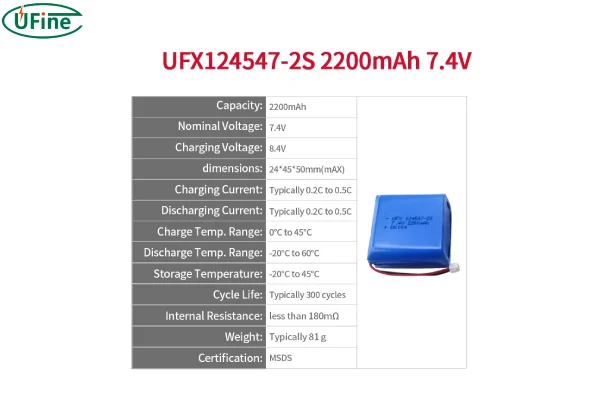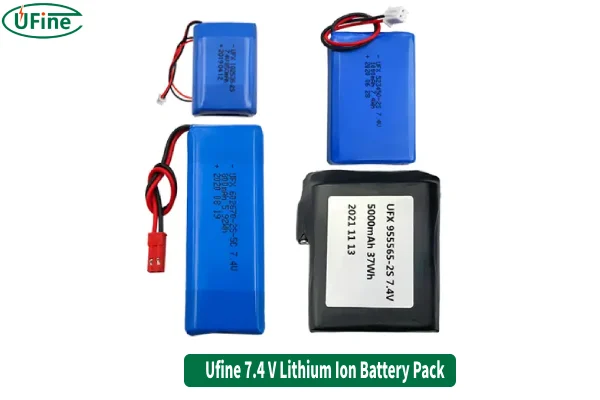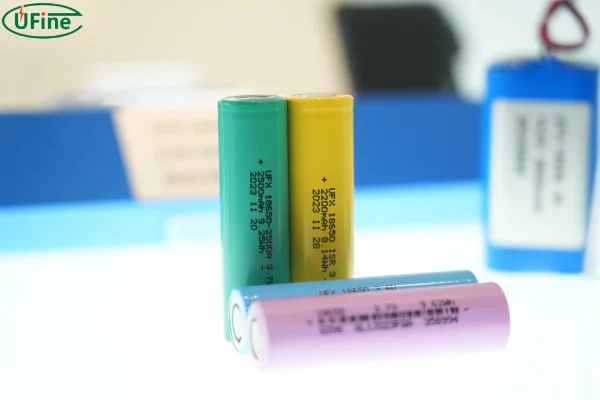This comprehensive guide will delve into the fascinating world of 7.4 volt batteries, exploring their definition, types, advantages, applications, charging methods, troubleshooting tips, and future trends.
Part 1. What is a 7.4 volt battery?
A 7.4 volt battery is a type of battery that delivers a nominal voltage of 7.4 volts. This voltage is achieved by connecting two individual battery cells in series, each cell having a nominal voltage of 3.7 volts.
Voltage Specifications and Chemistry
The voltage of a battery is a crucial factor that determines its power output. 7.4 volt batteries are commonly used in applications that require moderate to high power levels. The chemistry of a 7.4 volt battery can vary depending on the type of cells used.
Common Battery Chemistries:
- Lithium-Ion (Li-ion): Li-ion batteries are known for their high energy density, long lifespan, and relatively low self-discharge rate. They are widely used in smartphones, laptops, and electric vehicles.
- Lithium Polymer (LiPo): LiPo batteries are similar to Li-ion batteries but use a polymer electrolyte instead of a liquid electrolyte. This makes them lighter and more flexible, making them ideal for applications like drones and RC cars.
- Nickel-Metal Hydride (NiMH): NiMH batteries are a more traditional type of battery that offers a good balance of performance and affordability. They are often used in toys, power tools, and portable electronics.
Part 2. Types of 7.4 volt batteries
7.4 volt batteries come in various types, each with its own unique characteristics and applications. Let’s explore some of the most common types:
Lithium-Ion (Li-ion)
Li-ion batteries are the most popular type of 7.4 volt battery. They offer a high energy density, meaning they can store a large amount of energy in a compact size. Li-ion batteries are also known for their long lifespan and relatively low self-discharge rate.
Lithium Polymer (LiPo)
LiPo batteries are a specialized type of Li-ion battery that uses a polymer electrolyte. This makes them lighter and more flexible than traditional Li-ion batteries. LiPo batteries are often used in applications where weight and size are critical, such as drones, RC cars, and model airplanes.
Nickel-Metal Hydride (NiMH)
NiMH batteries are a more traditional type of battery that offers a good balance of performance and affordability. They are often used in applications where cost is a factor, such as toys, power tools, and portable electronics.
Comparison of Types
| Battery Type | Advantages | Disadvantages | Applications |
|---|---|---|---|
| Li-ion | High energy density, long lifespan, low self-discharge | Can be expensive, can overheat | Smartphones, laptops, electric vehicles |
| LiPo | Lightweight, flexible, high discharge rate | Can be expensive, short lifespan | Drones, RC cars, model airplanes |
| NiMH | Affordable, good performance | Lower energy density, shorter lifespan | Toys, power tools, portable electronics |
Part 3. Advantages of 7.4 volt batteries
7.4 volt batteries offer several advantages over other battery types, making them a popular choice for a wide range of applications.
Energy Density
7.4 volt batteries are known for their high energy density, meaning they can store a large amount of energy in a compact size. This makes them ideal for applications where space is limited, such as smartphones, laptops, and portable electronics.
Light Weight
LiPo batteries, in particular, are incredibly lightweight. This is a significant advantage for applications like drones and RC cars, where weight can significantly impact performance.
Rechargeability
7.4 volt batteries are rechargeable, meaning they can be used multiple times without needing to be replaced. This makes them a more environmentally friendly and cost-effective option than disposable batteries.
Discharge Characteristics
7.4 volt batteries can deliver a high discharge rate, meaning they can provide a large amount of power in a short period. This is essential for applications that require high power demands, such as electric vehicles and power tools.
Part 4. Common applications
7.4 volt batteries are used in a wide range of applications, both in everyday life and in specialized industries.
Everyday Applications
- Smartphones and Tablets: 7.4 volt batteries power the smartphones and tablets we use daily.
- Laptops and Notebooks: 7.4 volt batteries provide the energy needed for our laptops and notebooks.
- Power Tools: 7.4 volt batteries power cordless drills, saws, and other power tools.
- Toys and Hobbies: 7.4 volt batteries are commonly used in RC cars, drones, and other hobbyist applications.
Specialized Applications
- Electric Vehicles: 7.4 volt batteries are often used in electric vehicles, providing the power needed for propulsion.
- Medical Devices: 7.4 volt batteries power medical devices such as pacemakers and insulin pumps.
- Industrial Equipment: 7.4 volt batteries are used in industrial equipment such as forklifts and electric carts.
Part 5. Charging and maintenance
Charging and maintaining 7.4 volt batteries properly is essential for ensuring their longevity and performance.
Recommended Charger Type
The type of charger you use to charge your 7.4 volt battery depends on the battery’s chemistry. Li-ion and LiPo batteries require specialized chargers that can handle their specific voltage and current requirements.
Charging Time
The charging time for a 7.4 volt battery varies depending on its capacity and the charger’s output current. Generally, a 7.4 volt battery with a capacity of 2000mAh can take 2-3 hours to charge fully using a 1A charger.
Safety Tips for Maintenance
- Avoid Overcharging: Overcharging can damage the battery and shorten its lifespan.
- Avoid Deep Discharging: Deep discharging can also damage the battery.
- Store Properly: Store batteries in a cool, dry place away from heat and moisture.
- Handle with Care: Avoid dropping or mishandling batteries, as this can damage them.
Part 6. Troubleshooting common issues
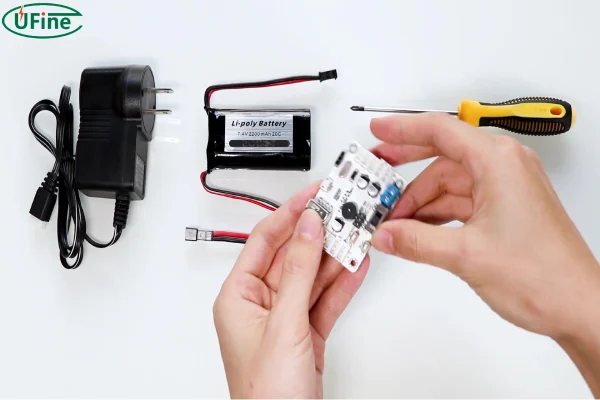
Like any electronic device, 7.4 volt batteries can sometimes experience issues. Here are some common problems and their solutions:
Overheating
Overheating can occur due to excessive charging or discharge rates. If your battery is overheating, stop using it immediately and allow it to cool down.
Reduced Capacity
Reduced capacity can occur over time due to battery degradation. If you notice a significant drop in battery life, it may be time to replace the battery.
Voltage Drops
Voltage drops can occur due to a faulty battery or a problem with the charging circuit. If you experience voltage drops, check the battery’s voltage and ensure it is within the acceptable range.
Solutions and Preventative Measures
- Use a Compatible Charger: Using a charger that is not compatible with your battery can cause damage.
- Avoid Extreme Temperatures: Extreme temperatures can damage the battery.
- Store Properly: Store batteries in a cool, dry place away from heat and moisture.
- Replace Damaged Batteries: Replace batteries that are damaged or have reached the end of their lifespan.
Part 7. Future trends in 7.4 volt battery technology
The field of battery technology is constantly evolving, and 7.4 volt batteries are no exception. Here are some exciting future trends:
Innovations in Battery Chemistry
Researchers are continuously developing new battery chemistries to improve energy density, lifespan, and safety.
Environmental Considerations
The environmental impact of battery production and disposal is a growing concern. Researchers are working on developing more sustainable battery technologies.
Expected Advancements in Performance
Future advancements in battery technology are expected to lead to higher energy density, faster charging times, and longer lifespans.
Part 8. Conclusion
7.4 volt batteries are a versatile and powerful energy source that plays a vital role in powering our modern world. From smartphones and laptops to electric vehicles and medical devices, these batteries are essential for our daily lives.
By understanding the different types of 7.4 volt batteries, their advantages, applications, charging methods, and troubleshooting tips, we can make informed decisions about using and maintaining these important energy sources. As battery technology continues to evolve, we can expect even more exciting advancements in the future.
Related Tags:
More Articles
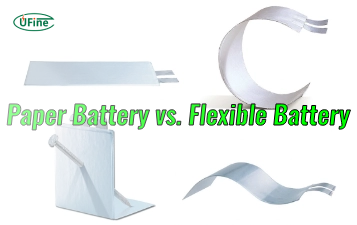
Paper Battery vs. Flexible Battery: What’s the Difference and Which Is Better?
Paper vs. flexible batteries: learn the key differences, benefits, and which power source fits best for wearables, sensors, and smart tech.
What to Know Before Buying a Tiny LiPo Battery for Your Project
Tiny LiPo batteries are powerful and compact. Learn how to choose the right one for your project with specs, safety, and charging tips.
Bloated LiPo Battery: Will It Explode?
Will a bloated LiPo battery explode? Discover the causes, risks, safety steps, and expert tips to avoid disaster and protect your gear. Must-read safety guide!
12V 100Ah Lithium Ion Battery Price: Full Guide
Learn about 12V 100Ah lithium-ion battery price, from cost ranges to best brands, hidden fees, and how to get the best deal. A must-read for smart buyers!
Resistance and Conductivity: What It Means for Your Lithium Batteries
Resistance and conductivity impact lithium battery performance, lifespan, and safety—learn how they work and why they matter.
